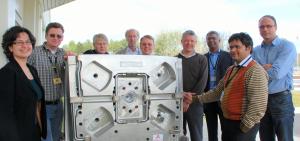First industrial contract in leak localization
Modern tokamaks are large, heavy and powerful machines that can be brought down by a mere pinhole in their vacuum system or piping networks. Whether microscopic or visible, holes, cracks and faults cause leaks, which in turn allow air, water or helium to diffuse into areas that are forbidden to them. At best, a leak can seriously degrade the machine's performance; at worst it can stop operations.
JET, for instance, while particularly reliable and despite having very few water-cooled components, experienced some 90 operation-stopping leaks between 1983 and 2006. Tore Supra, which is equipped with an actively-cooled first wall, has to manage an average of two in-vessel leaks per year.
Provided that they can be located and accessed, leaks can be fixed. In ITER however, the architecture and scale of the machine, the unique thermodynamics, restricted accessibility, and the progressive activation of the components will make leak localization particularly challenging.
ITER may not be able to operate at full performance if the total leak rate rises above the equivalent of 10 billionth of a drop of water, or a gram of gas, per second. Leak tightness in the torus, cryostat, neutral injection boxes, radiofrequency heating systems, etc., are all critical to optimal operation.
Beginning last year, an intense R&D program was started to develop risk-mitigating concepts linked to leak localization. Tasks have been launched in collaboration with the US and European Domestic Agencies, with Russian facilities, and a first industrial contract for leak localization simulations has recently been awarded to the French-Indian company Fluydin.
Last week, the ITER Vacuum Pumping Section held a kick-off meeting with the Fluidyn specialists. "We've asked them to model leaks from the high pressure water circuits into the vacuum vessel," explains ITER Vacuum Pumping Section Leader Robert Pearce and Leak Technical Engineer Liam Worth. "This is highly complex and has never been done before. Modelling leaks in ITER is a "multiphysics" affair involving different physics models, one of which requires sixty-term equations that have just recently been mastered ..."
While everything is being done to minimize the chance of leaks, "risks cannot be brought down to zero," say Robert and Liam. "We've taken all we could from the other tokamaks' experience. Soon, with models from Fluidyn and results from the work being conducted by the Domestic Agencies, and as part of a larger R&D program, we'll develop effective, new concepts in leak localization such as 'spectroscopic imaging of leak plumes' or 'multi-sensing pressure profiling' ..."


